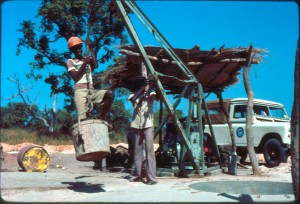An excerpt from Tubob: Two Years in West Africa with the Peace Corps
We desperately needed to get away, to have some R&R. My husband Bruce had projects to finish up before we left, and I didn’t want to miss Friday clinic, so we set a date for Saturday to go to Banjul, capital of our host country, The Gambia We’d get some business matters taken care of and then take a few days off to soak up sea breezes in Bakau.
Friday’s clinic was interminable with close to 300 patients. At the end of the day I had just enough energy left to pack for our trip. We couldn’t wait to go. When our friend Tombong stopped by that morning, we made arrangements for him to stay during the nights as our night guard. Daytimes, with all the coming and going, were not a concern.
Bruce had arranged for a driver and had made a list of project supplies to get and things to do while downriver. I planned to see Sister M’Boge, the head nurse for the Health Department, and also try to find visual aids to use when I was on trek. Our trips downriver never seemed to be only for pleasure, but at least they were a pleasant break in routine and climate.
The driver, a couple hours late, picked us up in a project Peugeot pickup truck and we were on our way. After only a few miles, the driver, Bubacar, said, “Mistah Bruce, we need fuel.”
“Why didn’t you get fuel before we left?”
“I forgot.”
We’d gone too far to go back. “Okay Bubacar,” Bruce said, resigned, “let’s stop at Bansang.” There were no regular gas stations. Government vehicles fueled at designated supply centers. Fuel for the UN well digging project was in either Basse or downriver at Yundum. So Bansang, although they had fuel, was not a regular supply outlet for the UN vehicles.
Running on fumes, we pulled into Bansang’s government supply yard. We all climbed out. Sitting in a parked car in that heat is impossible. The project vehicles were not air conditioned, but provided a breeze while moving. Bubacar and the mechanic at the shop launched into a heated argument.
I don’t think either of them realized that we understood much of what they said, since they were speaking in Mandinka. The Bansang fellow said words to the effect that there was a fuel shortage and he could only give fuel to their own vehicles.
Bubacar responded that he had to take Mistah and Missus Bruce downriver, so he had to have fuel.
The man repeated what he’d said earlier.
We almost laughed when Bubacar said, “Don’t you understand Mandinka?” in the same tone we would say, “Don’t you understand English?”
The man repeated he couldn’t give fuel for this truck unless he had his boss’s permission and he wouldn’t be there until the next day.
Bubacar thumped his finger on the mechanic’s chest. “Do you want to take these tubobs home with you to spend the night? We can’t leave without fuel.”
With that, the man filled our tank.
We were on our way again with a full tank, having only lost an hour. I sat in the middle of the front seat and dozed, welcoming an escape from the pickup’s hot, bumpy ride.
Suddenly I heard a shattering noise and felt pelting from hundreds of little pieces of windshield.
A truck had passed us on the gravel road and its wheel threw a rock, hitting our windshield and shattering it. Bubacar had a cut on his forehead; a small piece of glass still protruded from the wound. Bruce and I were not injured, but glass was everywhere. Bubacar pulled off to the side of the road. Bruce plucked the shard from the driver’s forehead and from the kit we always carried, cleaned the wound and bandaged it.
We shook glass out of our clothes and brushed it off the seat and out of the truck and continued on our way. Driving without a windshield is very nerve wracking. Wind rushed in, along with flying insects and gravel. Every time we encountered a vehicle, I held up a magazine to protect Bruce’s and my heads. Bubacar drove without any protection. After we got onto the paved road, it wasn’t as bad and we drove the remaining one hundred twenty miles without incident, though the howling wind in our faces became tiring.
As we arrived in Banjul, we passed another volunteer and I waved through where the windshield should be. The fellow looked surprised and we all laughed.
Bubacar dropped us off at the apartment we shared with other Peace Corps volunteers. I could never really enjoy myself until I straightened it up, washed the dishes, which always seemed to be left in the dishpan, put a clean sheet on the bed and made the apartment “home.” It was tiny and there were only the two of us staying there at the time.
Following our usual routine, we took showers and then walked to a small nearby hotel for dinner. We shook our heads over the journey down. Couldn’t a trip ever be just normal?



Always an inspiration, Mary.
Pingback: Mary E. Trimble: A Few Days Off | Camano Community
Thank you, Carmen. These experiences are fun to recall.